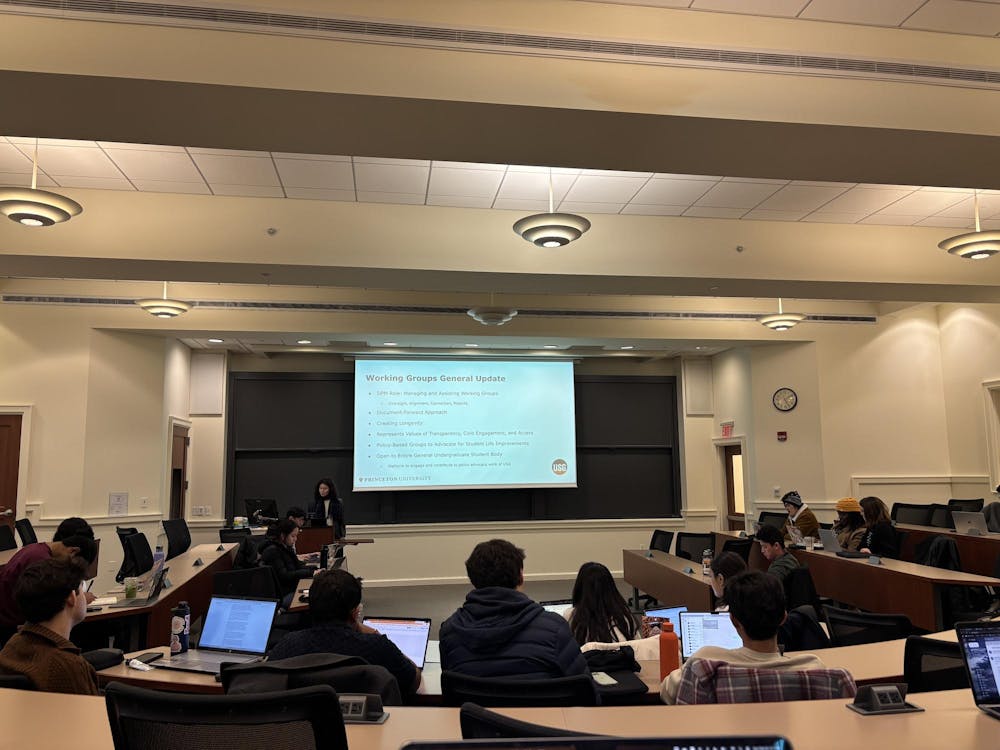The Undergraduate Student Government (USG) Senate convened for its third meeting of the spring semester on Sunday, Feb. 23 to discuss reforms to working groups, the role of the Undergraduate Student Life Committee (USLC), and a potential constitutional amendment to make the attendance policy more flexible.
USG President Enzo Kho ’26 started this week’s meeting with the presidential report. In what has become a recurring theme at USG meetings this semester, Kho cited former USG presidents, Jeff Siegel ’98 and Jason Weinstein ’90, to affirm his vision for the USG. In 1989, Weinstein spearheaded the “Campus Center Now” campaign that pushed for the development of a campus center from the then-Chancellor Green Student Center. The Frist Campus Center project was fully underway when Siegel came into office.
Kho added that, in the last few days, he and USG Chief of Staff Amy Park met with former USG Presidents Paul McDonald ’93 and Mayu Takeuchi ’23, who served in 1992 and 2022 respectively, to advise him on the responsibilities and challenges that come with higher office.
“Connecting with predecessors … offers such an invaluable insight into the work that we do,” Kho said.
Following this, Marvel Roth ’28, Deputy Project Manager for the USG, made a presentation to the Senate about reforming working groups, which are policy and project-based groups that are concerned with student life. Working groups are chaired by USG U-Councilors and are open to membership for all undergraduates. The USG has six working groups for the current academic year, focusing on Athletics, Civil Liberties, Dining, International Student Experience, Religious Life, and Transit.
In line with Kho’s focus on USG’s institutional memory, Roth said that the new aim for working groups is to adopt a “document-forward approach” to ensure that the work has a long-term focus.
“We’re creating longevity,” Roth said. “In the past we’ve had working groups be successful for a semester and then disband because there isn’t the materials for them to go forward off of.”
“We’re going to really focus on having documents so that our working groups can continue for years to come,” she added.

Afterwards, USG Social Life Chair Anuj Krishnan ’27 spoke to the Senate about the importance of the USLC, a committee that meets three times a year to review existing policies that affect undergraduate students and provide recommendations to the administration. Members of the USLC include Vice President for Student Life Rochelle Calhoun, Vice President for University Services Chad Klaus, and Director of Athletics John Mack ’00, among others.
Krishnan indicated that the USLC is interested in increasing the involvement of student perspectives on decisions related to student life. “We’ve talked about … allowing upperclassmen or those who are unaffiliated with eating clubs and co-ops to use dining halls during spring break,” he said.
“What we don’t realize often is that admin have [the] same interests in mind [as the students],” Krishnan said. According to Krishnan, the next USLC meeting will be March 17, and will be a working session on the upperclassman experience.
USG Vice President Aishwarya Swamidurai ’26 then read a proposed amendment for USG attendance policy. Currently the USG constitution requires senators who want an excused absence from the meeting to acquire a proxy and notify the executive secretary at least 24 hours in advance. According to the proposed amendment, the 24-hour requirement is “arbitrary” and inflexible, especially for short-term illnesses and emergencies.

The proposed amendment passed its first vote, and will be implemented into the USG Constitution if the second vote passes at the next meeting on Sunday, March 2.
A motion was then passed to allow for an executive session for the election of a U-Council Chair, at which point the meeting was closed to the public, and media was asked to leave.
This meeting took place in Aaron Burr, Room 219. USG Meetings are open for all students to attend and are held on Sundays from 5–6 p.m. in Robertson Hall 016.
Andrew Arthur is a staff News writer from London, England and typically covers USG, CPUC, Princeton's institutional legacy, and administrative matters.
Please send any corrections to corrections[at]dailyprincetonian.com.
Correction: a previous version of this article said that the attendance policy amendment had passed. In fact, the vote for the amendment must pass at two consecutive meetings before being implemented.








